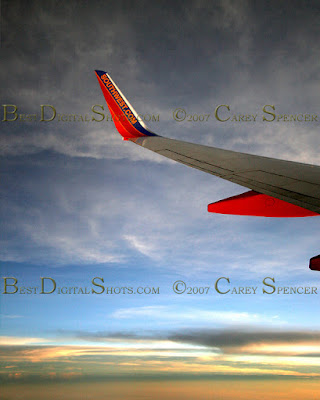Some Airlines to Charge For Checked Bags
 (I took the above picture on a flight from Florida. A Southwest Airlines blended winglet helps save fuel and serves as a good surface to advertise on.)
(I took the above picture on a flight from Florida. A Southwest Airlines blended winglet helps save fuel and serves as a good surface to advertise on.)As people try to figure out how to drive from their homes to the store, purchase a gallon of milk and loaf of bread, and get back without spending twice the hourly federal minimum wage ($5.85 per hour now and scheduled to increase to $6.25 per hour on July 24, 2008 pursuant to the Fair Minimum Wage Act of 2007), the airlines try to figure out how to transport Nashville’s approximately 10,000,000 passengers per year and the rest of the flying public from point A to point B with jet fuel prices that are 92.7% higher today than they were a year ago ($168.10 per barrel on June 6, 2008 as reported at IATA.org). As part of an answer to the latter question, American Airlines recently announced that starting June 15, 2008, certain passengers would have to pay $15.00 to check their first bag. United Airlines and US Airways announced Thursday that they would charge a similar fee. To date, Southwest Airlines, Nashville’s largest carrier, has stated that it will allow passengers to continue to check two bags free of charge.
The baggage charges have already started a heated debate among passengers and provided fuel for Southwest Airline’s new advertising campaign focused on the other airlines alleged nickel-and-diming of passengers. Another possible backlash to the charges (as passengers try to solve the former question above) may be increased weight in aircraft cabin overhead bins as passengers stuff more items into their carry-on bags to avoid checked bag fees. Of course, stuffing the overhead bins is the exact opposite of what safety consultants and the FAA recommend. As recently as October 1, 2007, the FAA provided the following tips, among others, for flyers to consider when carrying on bags: 1) Think Small (usually 45 linear inches maximum size and nothing oversized), 2) Think Smart (check more and carry on less), and 3) Think Safety (don’t stack items in the overhead bins and carry-on items may fall and injure someone in flight or during an emergency evacuation). Finally, passengers should know that the airlines may in certain situations require some or all of your bags be checked.
All of this dime squeezing is sure to cause tension at the airport. As a result, now more than ever, passengers should verify luggage size and weight restrictions with their airline before they fly. Hopefully, passengers and airline employees will be patient as the public struggles to meet its financial needs and the carriers juggle economics, aerodynamics, safety, technology and regulation to continue to provide safe and reasonably priced commercial aviation transportation.
The baggage charges have already started a heated debate among passengers and provided fuel for Southwest Airline’s new advertising campaign focused on the other airlines alleged nickel-and-diming of passengers. Another possible backlash to the charges (as passengers try to solve the former question above) may be increased weight in aircraft cabin overhead bins as passengers stuff more items into their carry-on bags to avoid checked bag fees. Of course, stuffing the overhead bins is the exact opposite of what safety consultants and the FAA recommend. As recently as October 1, 2007, the FAA provided the following tips, among others, for flyers to consider when carrying on bags: 1) Think Small (usually 45 linear inches maximum size and nothing oversized), 2) Think Smart (check more and carry on less), and 3) Think Safety (don’t stack items in the overhead bins and carry-on items may fall and injure someone in flight or during an emergency evacuation). Finally, passengers should know that the airlines may in certain situations require some or all of your bags be checked.
All of this dime squeezing is sure to cause tension at the airport. As a result, now more than ever, passengers should verify luggage size and weight restrictions with their airline before they fly. Hopefully, passengers and airline employees will be patient as the public struggles to meet its financial needs and the carriers juggle economics, aerodynamics, safety, technology and regulation to continue to provide safe and reasonably priced commercial aviation transportation.


Comments